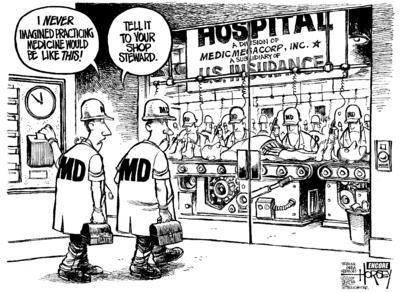- MENU
- HOME
- SEARCH
- WORLD
- MAIN
- AFRICA
- ASIA
- BALKANS
- EUROPE
- LATIN AMERICA
- MIDDLE EAST
- United Kingdom
- United States
- Argentina
- Australia
- Austria
- Benelux
- Brazil
- Canada
- China
- France
- Germany
- Greece
- Hungary
- India
- Indonesia
- Ireland
- Israel
- Italy
- Japan
- Korea
- Mexico
- New Zealand
- Pakistan
- Philippines
- Poland
- Russia
- South Africa
- Spain
- Taiwan
- Turkey
- USA
- BUSINESS
- WEALTH
- STOCKS
- TECH
- HEALTH
- LIFESTYLE
- ENTERTAINMENT
- SPORTS
- RSS
- iHaveNet.com
by Liz Wolgemuth

The job mobility of most workers shrinks in a recession, but for as many as 25 percent of workers, the freedom to move between jobs can be missing in high times, too.
This is the working-world phenomenon known as job-lock -- when workers won't leave their jobs because they can't afford to lose their healthcare benefits.
Some analyses suggest that healthcare reform could free up millions of job-locked workers to chase something new.
Most workers -- about 60 percent -- get their health insurance through their employers, and as health premiums have spiraled,
those benefits have become highly valuable to most. Nearly a quarter of top-performing employees said healthcare benefits were one
of the top three reasons they would leave an employer, and two thirds said healthcare benefits were an important reason to stay with
a company, according to a 2006
Last year, 78 percent of finance and accounting workers surveyed by the
The value of staying with the same employer -- and the same health plan -- goes beyond cost.
Job-lock is most common among people with pre-existing conditions, as they may not be able to get coverage of those conditions in a new plan. Workers in job-lock are unwilling to leave their existing jobs even when they would be more productive in a different position. Loyalty to doctors may prevent some workers from switching jobs and changing plans, according to a report by health economist Jason Shafrin.
It's safe to assume that if health reform legislation prevents insurers from refusing coverage based on pre-existing conditions,
"then those people who feel locked into their jobs because they're afraid they'll lose their benefits based on a pre-existing
condition will leave," says Peter Cappelli, a management professor at
Healthcare coverage tends to be less of an issue for young workers and more of an issue for parents and older workers.
"My guess is that what you'd really see, if you made healthcare less the preserve of larger employers, is you'd get more of those people able to leave," he says.
Most workers simply want jobs with healthcare coverage -- even if they have to switch plans -- and virtually all large employers
already offer benefits to most of their workers. While it's still unclear what precise shape healthcare reform will take, existing
bills in the House and
Small businesses pay as much as 18 percent more than large firms for the same health insurance policy, according to a report by the
president's
The bottom line: "Small firms are likely to be at a competitive disadvantage in the market for hiring workers," according to the council's report.
"Small firms are likely to have a more difficult time than larger firms recruiting potential employees who do not have health insurance from another source. Even if a small firm provides the best fit for a worker's skills and interests, the individual may choose not to work there, given the implicit tax."
Kris Dunn, a human resources executive and a blogger at HR Capitalist, says healthcare reform could strip away some of the power large companies command because they're able to offer better benefits, "thereby making start-ups and micro companies a more attractive option for more workers," Dunn says.
Similarly, reform could require a new strategy for companies that offer middle-market pay but make themselves competitive through benefits. Much will still depend, however, on how broader coverage is paid for, he notes.
When it comes to entrepreneurship and whether the ranks of the self-employed will boom with healthcare reform, the question will be one of affordability -- a quality that is largely in the eye of the beholder, says Blaine Bos, a partner and healthcare reform strategist at Mercer.
"Unless it's free, there are going to be individuals who are not going to be subsidized and are going to believe it's too much a percentage of their income and therefore still unaffordable," Bos says.
There is some debate over the scope of the job-locked population, as the group is difficult to measure. And there is little indication that large employers are worried about a mass exodus.
Patricia Friedman, a senior health benefits consultant with
Indeed, if job-locked workers are motivated to stay with their jobs merely for the health benefits, then employers may benefit when they leave for positions where they will be more productive.
WORLD | AFRICA | ASIA | EUROPE | LATIN AMERICA | MIDDLE EAST | UNITED STATES | ECONOMICS | EDUCATION | ENVIRONMENT | FOREIGN POLICY | POLITICS
Will Health Reform Free Workers From 'Job-Lock'?: A look at how healthcare reform will change employee benefits